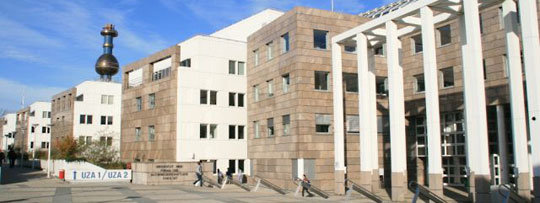Donnerstag, 30. Juni 2016, 17:00 - 18:30 iCal
Guest Lecture by Wilfred F. VAN GUNSTEREN (ETHZ)
"On the ethics of the academic scientific endeavour: where do we go?”
UZA 2, Room 2D 404 (Block D, Level 4)
Althanstraße 14, 1090 Wien
Lecture
"On the ethics of the academic scientific endeavour: where do we go?” by Wilfred F. VAN GUNSTEREN
Laboratory of Physical Chemistry; Swiss Federal Institute of Technology, ETH Zurich
Ombudsman; Swiss Federal Institute of Technology, ETH Zurich; www.igc.ethz.ch; www.igc.ethz.ch/people/wfvgn
on: Thursday, June 30th 2016; 17:00 (5:00 pm)
at: UZA II, Althanstraße 14, 1090 Vienna; Seminarroom 2D 404
Abstract:
What are the basic principles and rules of academic research? Academic research is primarily driven by curiosity, by the need to determine relationships between observations and the desire to develop models that can be used to understand and predict phenomena of the world in which we live. Irrespective of one’s intentions, one is easily fooled by flawed observations, missing, confounding variables or incorrect assumptions. For this reason, any model or theory that is proposed must be justified and tested against data that are both tangible and publicly available. Only in this way may other scientists check the validity of a proposed model or theory without having to repeat the original work. Academic research is a continuous process of refinement. Every generation of researchers stands to some extent on the shoulders of those who have gone before. It is in this way that we advance our knowledge and understanding of the world. This basic tenet of the academic endeavour in turn defines the fundamental requirements for effective research: clarity of presentation, reproducibility of data, testing of assumptions, search for additional variables, and the acknowledgement of both the ideas and the data used in the research but generated by others. The challenge is that these basic principles of high quality scientific research are increasingly in conflict with the mounting pressure placed on academic scientists to compete for grant money and to publish work continuously, in particular in so-called high-impact journals where sensationalism and potential media impact is often given more weight than scientific rigour. This in turn leads to inappropriate measures of success, which only serve to undermine the intrinsic value of the scientific endeavour. It may also corrupt the process of reviewing: (i) reviewing of manuscripts to be published in the scientific literature, (ii) reviewing of research proposals to be financed by funding agencies, (iii) reviewing of educational or research institutions with respect to their proper functioning, and (iv) reviewing of scientists with the aim of appointing or tenuring faculty. It may also influence the way PhD work is executed. The different types of violations of academic principles in scientific research and challenges and difficulties that may arise during a PhD are considered, and the ways potential problems can be avoided by PhD student and supervisor are discussed.
W.F. van Gunsteren, “The Seven Sins in Academic Behavior in the Natural Sciences”, Angew. Chem. Int. Ed. 52 (2013) 118-122; “On the Pitfalls of Peer Review”, F1000Rsearch 4 (2015) 1244; “Going for a PhD: Joys and Pitfalls”, Helv. Chim. Acta (2016) submitted
Contact: Doctoral Program MolTag, Dept. of Pharmacology and Toxicology; moltag.univie.ac.at, Please register at: Office.moltag@univie.ac.at
Zur Webseite der Veranstaltung
Veranstalter
DK Molecular Drug Targets - MolTag
Um Anmeldung wird gebeten
Kontakt
Susanne Menschik-Zunzer
Department of Pharmacology and Toxicology
DK Molecular Drug Targets
01 5277 55320
susanne.menschik-zunzer@univie.ac.at, office.moltag@univie.ac.at
Erstellt am Donnerstag, 09. Juni 2016, 13:04
Letzte Änderung am Montag, 13. Juni 2016, 09:08

